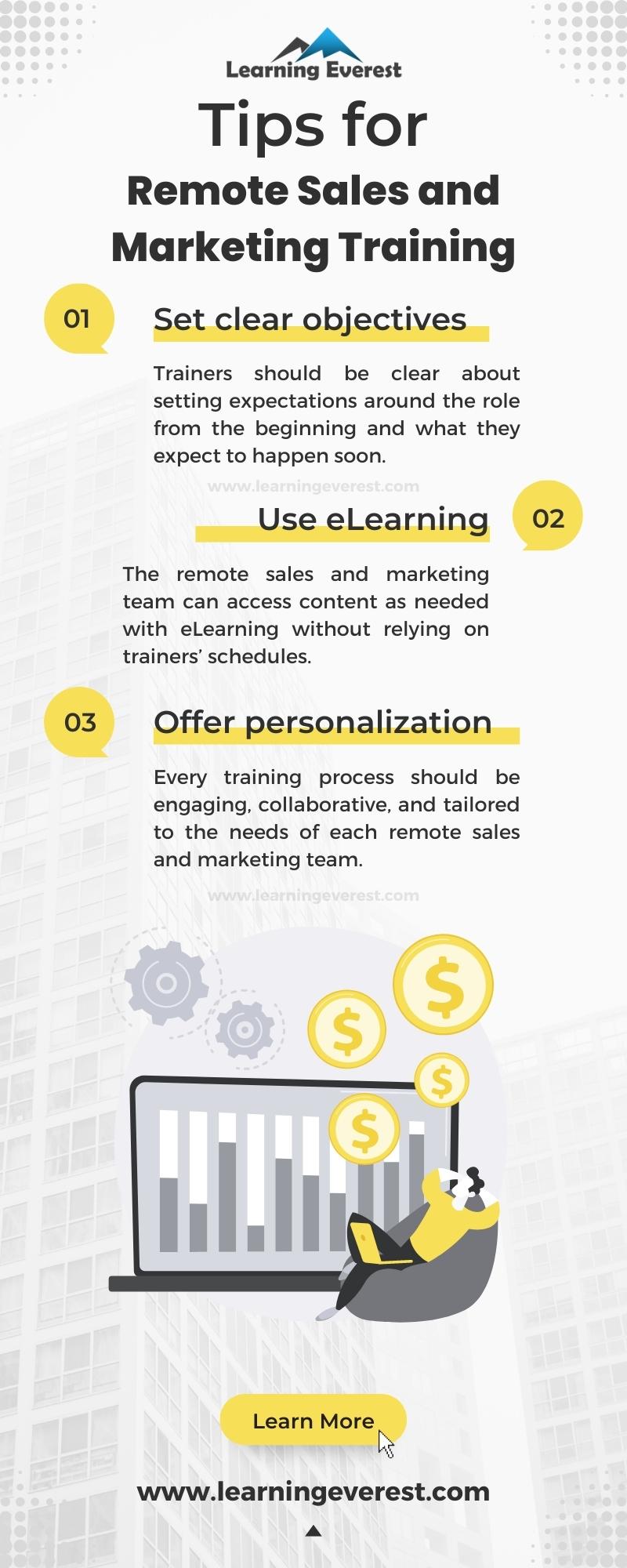With the rapid shift to remote work, sales teams have had to adapt their training methods to effectively develop the skills and knowledge of their remote sales force. eLearning has emerged as a powerful tool to provide remote sales teams with the training they need to succeed. In this article, we will explore ten valuable tips to consider when developing eLearning for remote sales teams.
Table of Contents
Tip 1: Understand the needs of your remote sales teams
Before diving into eLearning development, it is crucial to understand the specific needs and challenges of your remote sales teams. Conduct surveys or interviews to gather insights into their training requirements, preferred learning styles, and potential obstacles they may face in a remote setting.
Tip 2: Set clear learning objectives while developing eLearning for remote sales teams
Define clear and measurable learning objectives for your eLearning program. These objectives should align with your sales team’s goals and provide them with the knowledge and skills they need to succeed in their roles. Clear learning objectives help keep the eLearning content focused and relevant.
Tip 3: Create engaging and interactive content is essential while creating eLearning for remote sales teams
To keep remote sales teams engaged and motivated, develop interactive and multimedia-rich eLearning content. Incorporate videos, quizzes, case studies, simulations, and real-life scenarios to create an immersive learning experience. Engaging content enhances knowledge retention and application.
Tip 4: Provide on-demand access to learning materials to your remote sales teams
One of the advantages of eLearning is the ability to provide on-demand access to learning materials. Ensure that your eLearning platform allows remote sales teams to access training modules, resources, and support whenever and wherever they need it. This flexibility empowers sales teams to learn at their own pace and in their preferred environment.
Tip 5: Foster collaboration and interaction
Encourage collaboration and interaction among remote sales team members through discussion boards, online forums, and virtual group activities. Facilitate peer-to-peer learning and knowledge sharing to enhance engagement and build a sense of community.
Tip 6: Incorporate real-life scenarios which the sales team can relate to
To make eLearning more practical and applicable to real-world situations, incorporate real-life scenarios and examples that remote sales teams may encounter in their roles. This helps them develop problem-solving skills and better prepares them for various sales situations they may encounter remotely.
Tip 7: Provide ongoing feedback and assessments to your sales team
Implement regular assessments and provide timely feedback to remote sales teams. This allows them to track their progress, identify areas for improvement, and receive guidance from trainers or mentors. Feedback and assessments help reinforce learning and ensure continuous development.
Tip 8: Personalize the learning experience to your remote sales team
Tailor the eLearning experience to meet the individual needs of remote sales team members. Provide opportunities for personalized learning paths based on their existing skills, knowledge gaps, and career goals. Personalization increases engagement and promotes a sense of ownership over the learning process.
Tip 9: Leverage technology and tools is essential while delivering elearning to your remote sales team
Leverage technology and eLearning tools that enhance the remote learning experience. Utilize video conferencing platforms, learning management systems (LMS), virtual classrooms, and mobile learning applications to facilitate seamless communication, content delivery, and progress tracking.
Tip 10: Evaluate and iterate
Regularly evaluate the effectiveness of your eLearning program for remote sales teams. Collect feedback from participants, analyze training outcomes, and make necessary adjustments based on the data and insights gathered. Continuous evaluation and iteration ensure that your eLearning program remains relevant and impactful.
Infographics
Conclusion
Developing eLearning for remote sales teams requires careful consideration of their unique needs and the effective use of technology and interactive content. By following these ten tips, you can create a robust eLearning program that equips your remote sales teams with the skills and knowledge needed to excel in their roles. Remember to continually evaluate and adapt your eLearning approach to ensure ongoing success in the ever-evolving remote work environment.






